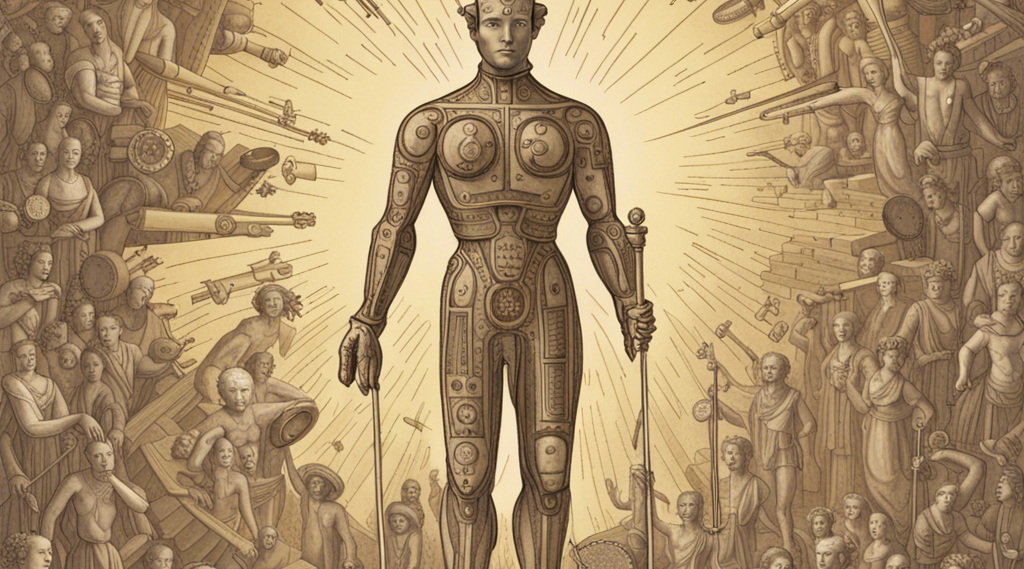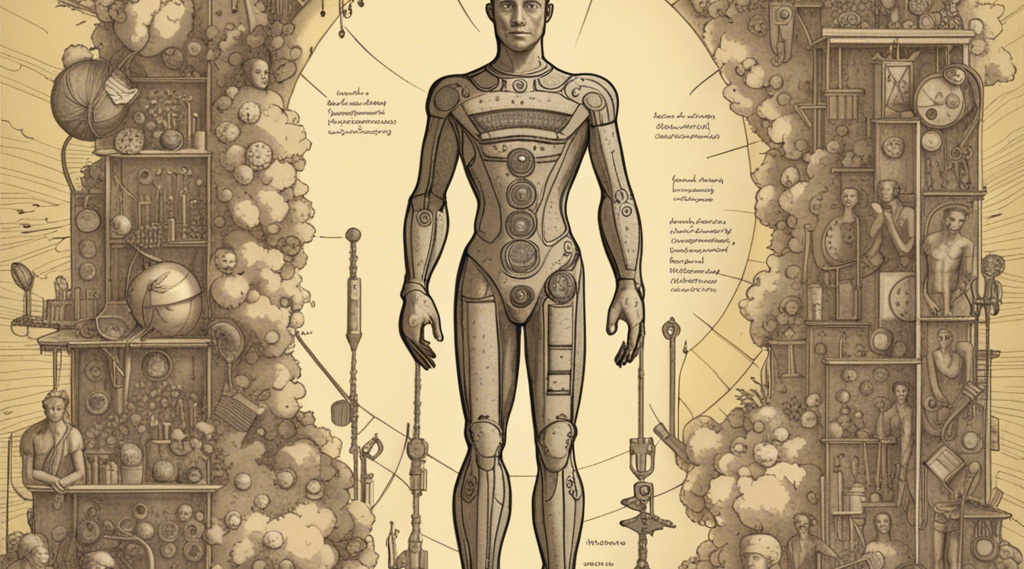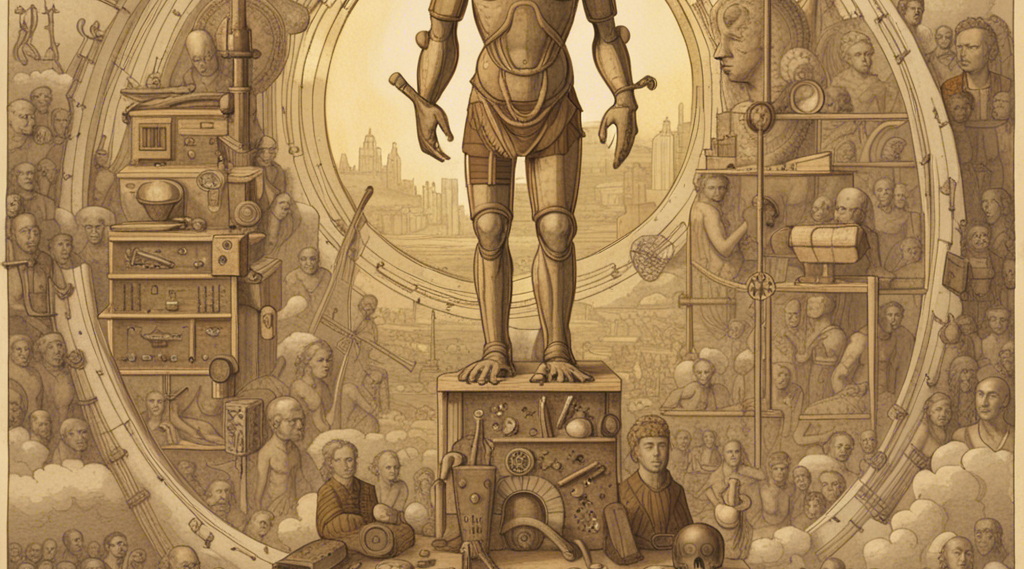
Chapter 1 What’s the Book Homo Deus
"Homo Deus: A Brief History of Tomorrow" is a book written by Yuval Noah Harari, an Israeli historian and professor at the Hebrew University of Jerusalem. It was published in 2015 and explores the future of humankind in light of technological advancements and societal changes.
In "Homo Deus," Harari takes the reader on a thought-provoking journey that goes beyond the history of Homo sapiens. He examines how humans have conquered the challenges of famine, disease, and war to a large extent, and now sets his sights on new aspirations for the future. The book delves into various topics, including the potential impact of biotechnology, artificial intelligence, and other emerging technologies on society and human evolution.
Harari presents a compelling argument about the potential direction our species may take, discussing themes such as the merging of humans and machines, the possibility of immortality, the rise of dataism (the belief in the power of information), and the potential consequences of these developments on our individuality and values.
While "Homo Deus" raises many provocative questions and offers profound insights, it's important to note that the author presents different possibilities rather than definitive predictions. Overall, the book provides readers with a unique perspective on the future of humanity and invites them to ponder the ethical, political, and social implications of our rapidly changing world.
Chapter 2 Why is Homo Deus Worth Read
According to reddit comments on Homo Deus, Homo Deus: A Brief History of Tomorrow, written by Yuval Noah Harari, is worth reading for several reasons:
- Thought-provoking insights: Homo Deus explores the future trajectory of humankind, delving into topics such as artificial intelligence, genetic engineering, and immortality. Harari presents thought-provoking ideas about the potential directions our species could take in terms of technology, society, and the human experience.
- Historical context: The book builds upon Harari's previous work, Sapiens: A Brief History of Humankind, providing a historical foundation that helps readers understand how we arrived at our current state. By examining our past, Homo Deus offers a unique lens through which to view the future.
- Interdisciplinary approach: Harari skillfully combines history, philosophy, biology, and other disciplines to analyze the challenges and opportunities that lie ahead. This interdisciplinary perspective offers a comprehensive understanding of the complex factors shaping our future.
- Engaging writing style: Harari's writing is accessible, engaging, and thoughtfully crafted. He presents complex concepts in a clear and understandable manner, making Homo Deus an enjoyable read for both experts and those less familiar with the subject matter.
- Ethical considerations: The book raises important ethical questions regarding the potential impact of emerging technologies on human society. Harari prompts readers to reflect on the ethical implications of advancements like automation, data processing, and biotechnology, stimulating meaningful discussions about the choices we face.
- Long-term perspective: Homo Deus encourages readers to think beyond immediate concerns and consider the long-term implications of our actions. By exploring possible future scenarios, the book fosters a sense of responsibility and encourages proactive engagement to shape the world we want to live in.
Overall, Homo Deus offers a captivating exploration of the future of humanity, encouraging readers to critically examine our assumptions, question societal norms, and envision the possibilities that lie ahead.
Chapter 3 Homo Deus Summary
In the book "Homo Deus" written by Yuval Noah Harari, the renowned historian and author of "Sapiens," a fascinating vision of the future unfolds. This groundbreaking work delves into the potential trajectory of humankind, examining how science, technology, and societal changes may shape our species' destiny. From the quest for immortality to the rise of artificial intelligence, Harari provides thought-provoking insights that challenge conventional beliefs about what it means to be human. With a blend of historical analysis, philosophical reflections, and speculative scenarios, "Homo Deus" illuminates the thrilling possibilities and profound questions that lie ahead for humanity.

Chapter 4 Homo Deus Author
Yuval Noah Harari is an Israeli historian and professor at the Hebrew University of Jerusalem. He is best known for his books "Sapiens: A Brief History of Humankind," "Homo Deus: A Brief History of Tomorrow," and "21 Lessons for the 21st Century."
Harari's work explores the history and future of humanity, drawing on various disciplines such as biology, history, anthropology, and philosophy. In "Sapiens," he provides a sweeping overview of human history, from the emergence of Homo sapiens in Africa to the rise of civilizations and the present day.
In "Homo Deus," Harari examines the potential trajectory of human development in the coming decades. He explores themes like artificial intelligence, genetic engineering, and the impact of technology on society. The book raises thought-provoking questions about the future of humanity and our ability to shape it.
"21 Lessons for the 21st Century" focuses more on the present challenges facing humanity. Harari delves into topics such as nationalism, fake news, inequality, and the role of technology in shaping our lives. He offers insights and suggestions for navigating the complex issues of our time.
Harari's writing style is accessible, engaging, and thought-provoking. He has gained widespread popularity for his ability to break down complex ideas and present them in a way that resonates with a broad audience. His work has had a significant impact on public discourse, stimulating discussions about our past, present, and future as a species.
Chapter 5 Homo Deus Meaning & Theme
1. Homo Deus Meaning
"Homo Deus: A Brief History of Tomorrow" is a book written by Yuval Noah Harari that explores the future of humanity, the potential paths our species could take, and the implications of technological advancements on our society. In this thought-provoking and speculative work, Harari delves into various themes such as artificial intelligence, genetic engineering, immortality, and the potential rise of a new class of humans called "Homo Deus" (meaning "God-like humans").
The title itself suggests that the book aims to provide a historical perspective on the trajectory of human civilization, while also contemplating how our present actions and advancements might shape the future course of our species. Harari challenges readers to consider the social, ethical, and existential questions that arise as we push the boundaries of technology and redefine what it means to be human.
Ultimately, the meaning of "Homo Deus: A Brief History of Tomorrow" lies in its exploration of the possible futures that await us and the important choices we face as a species. It encourages us to reflect on the impact of our actions, both individually and collectively, as we navigate the complex territory of technological progress and its implications for human society.
2. Homo Deus Theme
The theme of "Homo Deus: A Brief History of Tomorrow" by Yuval Noah Harari revolves around the future of humanity and the potential evolution of Homo sapiens into a new species, Homo Deus. The book explores the idea that as humans gain more control over their biological and cognitive abilities through advancements in technology, they may transcend their current limitations and become god-like beings.
One major theme in the book is the power of algorithms and data. Harari argues that in the modern age, information has become the most valuable resource, and those who possess vast amounts of data can wield immense power. As technology progresses, algorithms will increasingly shape our lives, influencing our decisions, desires, and even our identities. The book raises questions about how this reliance on algorithms might affect our autonomy, human agency, and ultimately restructure society.
Another key theme is the potential for the rise of techno-humanism. Harari explores the idea that humans may become increasingly reliant on technological enhancements, such as artificial intelligence, genetic engineering, and biotechnology, to overcome physical and cognitive limitations. This leads to a future where humans may strive for immortality, superintelligence, or other extraordinary capabilities. However, the book also delves into the ethical dilemmas and socio-political implications that arise from these advancements.
Additionally, "Homo Deus" discusses the erosion of traditional belief systems and religions in favor of the pursuit of happiness and personal fulfillment. Harari examines how humanity's focus has shifted from seeking salvation in the afterlife to seeking happiness and well-being in the present life. This transition challenges religious narratives and calls into question the purpose and meaning of life in a world driven by human desires and aspirations.
Overall, "Homo Deus: A Brief History of Tomorrow" delves into profound philosophical, moral, and existential questions about the future of humanity. It explores the potential consequences of our technological progress, the role of data and algorithms in shaping society, and the transformation of human nature itself.
Chapter 6 Exploring Digital Resources on Homo Deus
If you're in search of a diverse range of book formats and concise summaries on the topic of Homo Deus, we suggest exploring platforms like Bookey. They boast an extensive collection of books available in various formats, accompanied by short summaries that give a quick glimpse into each book's content. This is particularly advantageous for individuals seeking a comprehensive overview without investing excessive time. However, if you prefer delving into a complete book experience and enjoy holding physical copies, we highly recommend visiting Amazon. They offer an extensive selection of physical books covering Homo Deus, along with complementary titles like "Homo Deus: Breve historia del mañana (Spanish Edition) Kindle Edition" that provide deeper insights and informative content. Regrettably, we are unable to provide a direct PDF version of Homo Deus within this post, as our main goal is to present the book's value and offer alternative reading options.
We wish you joyful reading adventures!

Chapter 7 Homo Deus Quotes
Homo Deus quotes as follow:
- "In seeking to upgrade humanity, we are in fact downgrading humans into information processors."
- "The only thing we can try to do is to avoid engineering people's desires and make sure that technology serves our values rather than manipulating them."
- "Dataism asserts that the universe consists of data flows and that the value of any phenomenon or entity is determined by its contribution to data processing."
- "Humans were always far better at inventing tools than using them wisely."
- "Religion is a deal, whereas spirituality is a journey."
- "Bioengineering enables us to redesign not just bodies and brains, but also desires and choices."
- "The greatest scientific discovery was the discovery of ignorance."
- "We are now facing humankind's biggest split into different classes since the end of the Middle Ages."
- "Sapiens may soon be transformed into Homo Deus, godlike beings that can manipulate their own desires and design the world according to their wishes."
- "For the first time in history, more people die today from eating too much than from eating too little."
Please note that these quotes are attributed to the author Yuval Noah Harari from his book "Homo Deus."
Chapter 8 Books Like Homo Deus
If you enjoyed reading "Homo Deus" by Yuval Noah Harari and are looking for similar books, here are some recommendations:
- "Sapiens: A Brief History of Humankind" by Yuval Noah Harari - This is the prequel to "Homo Deus" and explores the history and impact of Homo sapiens on the world.
- "Life 3.0: Being Human in the Age of Artificial Intelligence" by Max Tegmark - Tegmark discusses the influence of artificial intelligence and how it may shape our lives and civilization.
- "The Future of Humanity" by Michio Kaku - In this book, physicist Michio Kaku explores the possibilities and challenges of space exploration, discussing topics like colonizing other planets and achieving a type II civilization.
- "The Fourth Industrial Revolution" by Klaus Schwab - Schwab discusses the technological advancements that are reshaping our world, including artificial intelligence, robotics, and biotechnology, and how they will impact society.
- "Homo Deus: Plague Inc." by Eduardo Robles-Piquer - This book takes inspiration from Harari's "Homo Deus" and explores the implications of emerging technologies on human society.
- "Superintelligence: Paths, Dangers, Strategies" by Nick Bostrom - Bostrom examines the potential consequences of artificial superintelligence and its impact on humanity's future.
- "21 Lessons for the 21st Century" by Yuval Noah Harari - Also written by Harari, this book delves into the challenges and questions that humanity faces in the present era, such as the rise of technology and the future of work.
These books cover various aspects of humanity's past, present, and future, diving into topics like technology, artificial intelligence, and the challenges we face as a species.